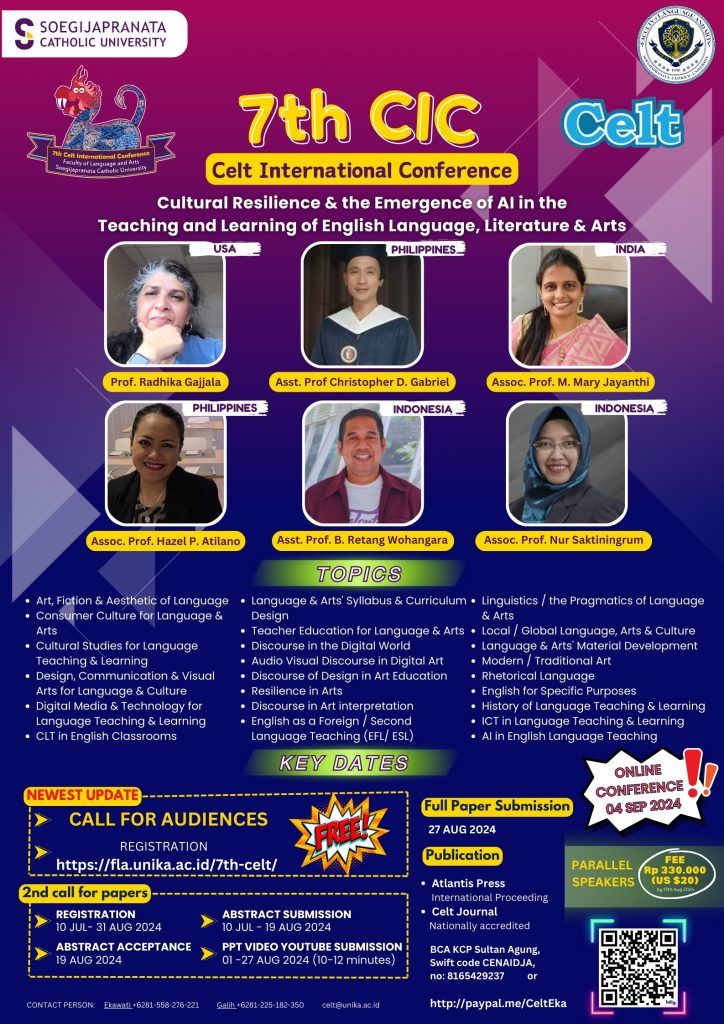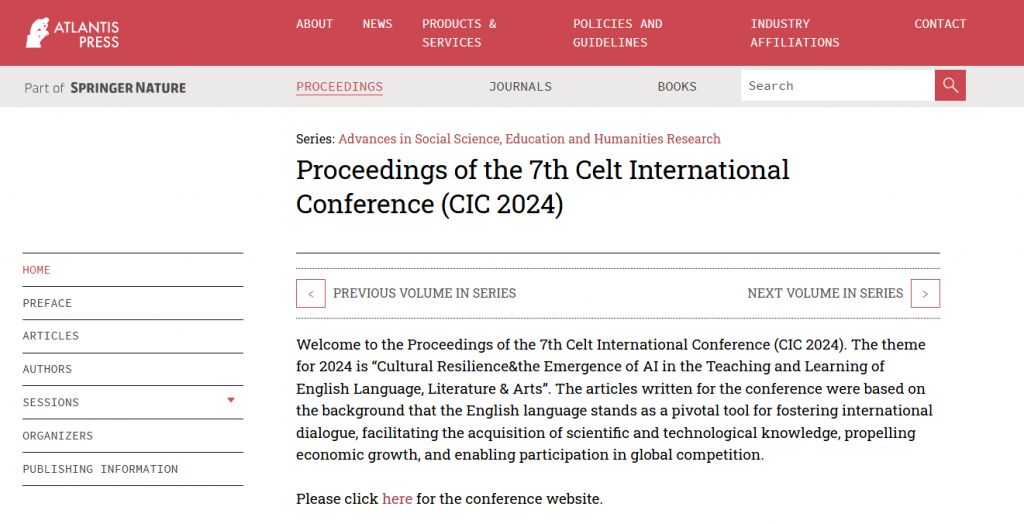
Cultural Resilience & the Emergence of AI in the Teaching and Learning of English Language, Literature & Arts
The English language stands as a pivotal tool for fostering international dialogue, facilitating the acquisition of scientific and technological knowledge, propelling economic growth, and enabling participation in global competition. Its prestigious role in a myriad of domains has significantly elevated the importance of English Language Teaching (ELT). Among the emerging approaches in ELT, the integration of Artificial Intelligence (AI), particularly within the framework of Communicative Language Teaching (CLT), offers transformative potential. To harness the benefits of AI in ELT, substantial investments have been directed towards modernizing educational curricula, revising English syllabi to incorporate AI-driven principles and methodologies, developing communication-oriented textbooks, crafting skill-focused assessments, and enhancing educators’ comprehension of novel language learning theories and pedagogies. This comprehensive approach aims to elevate the effectiveness of ELT by aligning it with contemporary technological advancements. However, the widespread endorsement of CLT and AI integration is not without its challenges. Despite the professed commitment of many educators to CLT, resistance persists across both Eastern and Western educational contexts. Cultural specialists and educators frequently debate the necessity, appropriateness, and efficacy of CLT and AI in language teaching. This ongoing debate underscores several constraints, including insufficient resources, limited instructional time, and a lack of linguistic and sociocultural competence among educators. Consequently, ELT pedagogies have evolved differently across various social, cultural, and economic environments, reflecting the diverse contexts in which they are implemented. The 7th Celt International Conference (CIC) aims to provide a critical platform for examining the complexities of integrating CLT and AI within the culturally nuanced landscapes of English Language, Literature, and Arts education. The conference will explore how deeply ingrained cultural expectations can conflict with the adoption of innovative teaching methodologies, and how such resilience can be navigated to enhance the educational experience. We invite educators, policymakers, sociologists, cultural experts, business leaders, artists, and entrepreneurs to participate in the 2024 CIC Webinar. This event, themed “Cultural Resilience and the Emergence of AI in the Teaching and Learning of English Language, Literature, and Arts,” will facilitate an exchange of experiences, ideas, and practices that address the intersection of tradition and innovation in the context of ELT. Your participation will contribute to a richer understanding of how to effectively integrate AI in language education while respecting and adapting to cultural particularities. Join us in this crucial dialogue and be part of shaping the future of English Language, Literature, and Arts education amidst the challenges and opportunities presented by AI and cultural resilience.
Topics
- Art, Fiction & Aesthetic of Language
- Consumer Culture for Language & Arts
- Cultural Studies for Language Teaching & Learning
- Design, Communication & Visual Arts for Language & Culture
- Digital Media & Technology for Language Teaching & Learning
- CLT in English Classrooms
- Linguistics/ the Pragmatics of Language & Arts
- Local/ Global Language, Arts & Culture
- Language & Arts’ Material Development
- Modern/ Traditional Art
- Rhetorical Language
- Language & Arts’ Syllabus & Curriculum Design
- Teacher Education for Language & Arts
- Discourse in the Digital World
- Audio Visual Discourse in Digital Art
- Discourse of Design in Art Education
- Resilience in Arts
- Discourse in Art interpretation
- English as a Foreign/ Second
- Language Teaching (EFL/ ESL)
- English for Specific Purposes
- History of Language Teaching & Learning
- ICT in Language Teaching & Learning
- AI in English Language Teaching
Aims
- Encourage and foster discussions among teachers, practitioners, policy makers, and those who are interested in using language of communication, such as English for the area of business and education, and any other topic relevant to their issue areas
- Share best practices, teaching experiences, and policies to increase students’ language and arts competencies for their future professions
- Provide an avenue for the professional development of teachers, practitioners, and policy makers
Publication Opportunities
Presentations encouraged as manuscripts for publication in a journal / international proceeding (with add on price), could be on:
- utilizing the most appropriate teaching methods and approaches of understanding English culture and society by integrating the knowledge learnt from the field of language, culture and arts;
- exploring challenges in methods and approaches in successfully teaching language by appreciating its culture and arts;
- exploring numerous ways of integrating culture and arts as an appropriate aid and material for understanding narratives that deal with private voices or public self-hood;
- designing applicable curriculum for the better teaching of language, arts and culture;
- maximizing digital media and technology to better appreciate language, arts and culture;
- challenging innovative ways to integrate language, arts and culture with other humanities discipline;
- defining the aesthetic ideology and conceptions of literature;
- conceptualizing vernacular and literary language;
- reconstructing historical reality and fictional truths;
- comprehending the changing landscape and/ or the transnational
- characteristics of the young generation’s consumer and/ or digital culture.
Celt journal template https://journal.unika.ac.id/index.php/celt
International proceeding template bit.ly/intprcpprtmp7thcic
Declaration Form bit.ly/7thCIC-dec-form
YouTube tutorial bit.ly/youtubeupload7thcic
Editorial Policy
- The management of papers submitted for publication after the conference will be overseen by a scientific committee comprised of an editorial board and peer reviewers chosen from diverse institutions and expertise across different countries.
- All manuscripts submitted to 7th CIC must adhere to the Rationale, Aims and Scope of Topics as determined by the peer review process. These manuscripts should exhibit novelty, creativity and avoid any instances of misconduct.
- It is imperative that manuscripts are written in proficient English. Authors, particularly non-native English speakers, are strongly advised to have their manuscripts proofread by professionals before submission.
- Authors must strictly avoid plagiarism and are encouraged to employ plagiarism detection software for verification. Editors will assess the similarity index using Turnitin, with 7th CIC accepting manuscripts with a similarity index below 10%.
- The final decision regarding submitted manuscripts rests with the Editor, based on the critical comments provided by the reviewers.
- Participants will be subject to charges determined by the scientific committee in accordance with their agreement.
- Selected papers meeting the criteria will have the opportunity for publication in either Celt journal (minimum 10), an international e-proceeding (minimum 20) or ISBN book (minimum 20).
- If the minimum required articles are not met, then the committee have the rights to decide how to publish the papers.
Review Procedures
- Initial paper submissions sent to celt@unika.ac.id underwent screening by the reviewers who assessed the general quality and suitability.
- All reviews and communication with authors occur exclusively through the email.
- Authors are given the chance to apply for which chosen publication media by signing a Declaration Form.
- Authors of rejected submissions are offered the chance to amend and resubmit their work by incorporating the feedback from the reviewers. The decision on acceptance or rejection of a revised manuscript is definitive.
Quality Criteria
Reviewers are directed to evaluate the quality of submissions on the academic merit of the content, which takes into consideration the following criteria
- Relevance of Topic: Assessing how the topic discussed in the paper aligns with the theme of the conference.
- Originality/Novelty: Evaluating the extent to which the topic demonstrates originality or presents novel ideas.
- Depth of Analysis: Assessing the extent to which the authors delve into the analysis of the research findings comprehensively.
- Significance: Examining the paper’s contribution to the field and its impact.
- Methodology: Evaluating the relevance of the author’s chosen methodology to the proposed aims and its role in generating meaningful findings.
Similarity Ethics
The publisher conducts thorough checks on all papers for textual overlap to identify potential instances of plagiarism. The 7th CIC committee employs Turnitin to screen all papers before review, and only articles with a similarity index below 10% are accepted for further process.
Submission Flow

Abstract Submission
Please click register now to submit your abstract
Key Dates
ABSTRACT SUBMISSION
10 JULY – 17 AUGUST 2024
ABSTRACT ACCEPTANCE
19 AUGUST 2024
REGISTRATION
10 JULY – 31 AUGUST 2024
PPT VIDEO YOUTUBE SUBMISSION (10-12 minutes)
01 -19 AUGUST 2024
FULL PAPER SUBMISSION
27 AUGUST 2024
ONLINE CONFERENCE DATE
04 SEPTEMBER 2024
Registration Fee
REGISTRATION FEE Rp 330.000 (US $20)
by 17th Aug 2024
BCA KCP Sultan Agung,
Swift code CENAIDJA,
no: 8165429237
7th CIC Committee
Host
- English Department, Faculty of Language and Arts, SCU (Soegijapranata Catholic University), Indonesia
Advisors / Steering Committee
- Dr. Ferdinand Hindiarto, S.Psi., M.Si., Rector of SCU (Soegijapranata Catholic University)
- G.M. Adhyanggono, S.S., M.A., Ph.D., Dean of the Faculty of Language and Arts, SCU (Soegijapranata Catholic University)
Chairperson
- Assoc. Prof. Dr. Dra. Ekawati Marhaenny Dukut, M.Hum. (Soegijapranata Catholic University)
Secretary
- Galih Candra Wijaya, S.S. (Soegijapranata Catholic University)
- Glecia Valen Wijaya (Soegijapranata Catholic University)
Treasurer
- A. Purmawanti, S.Ak. (Soegijapranata Catholic University)
MC
- Evelyna Nissi Adjikusuma, S.S. (Soegijapranata Catholic University)
Conference Coordinator
- Krismalita Sekar Diasti, S.Pd, M.Pd. (Soegijapranata Catholic University)
Moderator
- Assoc. Prof. Dra. Cecilia Titiek Murniati, S.S, M.A, Ph.D. (Soegijapranata Catholic University)
- Angelika Riyandari, S.S., M.A, Ph.D. (Soegijapranata Catholic University)
Keynote Speakers
- Prof. Radhika Gajjala, Ph.D. (Bowling Green State University, Ohio, USA)
Asst. Prof. Christopher D. Gabriel, BA, MA (De La Salle University – Dasmarinas, The Philippines)
- Assoc. Prof. M. Mary Jayanthi, M.A., M.Phil., Ph.D. with SLET (Holy Cross College (Autonomous), India)
- Assoc. Prof. Hazel P. Atilano, LPT, Ph.D. (University of St. La Salle, Bacolod, Philippines)
- Assoc. Prof. Dr. Nur Saktiningrum, S.S., M.Hum. (Gadjah Mada University, Indonesia)
- B. Retang Wohangara, S.S., M.Hum. (Soegijapranata Catholic University, Indonesia
Documentation & Promotion
- Paulus Metta Dwi Manggala Putra, S.Pd., M.Pd. (Soegijapranata Catholic University)
Entertainment Coordinator & Zoom Operator
- Y. Yogi Tegar Nugroho, S.Sn., M.A. (Soegijapranata Catholic University)
Entertainers
- Flacoustic
- Alfredo Corsel (Soegijapranata Catholic University)
- Davian Paranamya Kustanta (Soegijapranata Catholic University)
- Destyna Eka Putri (Soegijapranata Catholic University)
- Nur Dhafin Bakhtiyar (Soegijapranata Catholic University)
- Fransiskus Martin (Soegijapranata Catholic University)
Parallel Room Moderator Coordinator
- Dra. Wuryani Hartanto, M.A. (Soegijapranata Catholic University)
Paper Editor & Layouter
- Ignatius Setya Dwiyana (Soegijapranata Catholic University)
- Assoc. Prof. Dr. Dra. Ekawati Marhaenny Dukut, M.Hum. (Soegijapranata Catholic University)
Parallel Room Moderators
- Gracelyn Audrey Kurniawan G. (Soegijapranata Catholic University)
- Jason Frey Gunawan P.
- Syalom Lael Hendraputra (Soegijapranata Catholic University)
- Anastasia Evangelina (Soegijapranata Catholic University)
- Nayla Firza Valindria (Soegijapranata Catholic University)
Parallel Room Operators
- Derian Titan (Soegijapranata Catholic University)
- Tan, Reynerd Emmanuel Setiawan (Soegijapranata Catholic University)
- Fabio Ernesto Valenciano (Soegijapranata Catholic University)
- Vincentius Archiel Christian (Soegijapranata Catholic University)
- Liem Daniel Delroy (Soegijapranata Catholic University)
Refreshments
- Dr. Emilia Ninik Aydawati, SP, MPd. (Soegijapranata Catholic University)
Facilities
- YR. Udik Partono (Soegijapranata Catholic University)
Cleaning
- Agus Winarni (Soegijapranata Catholic University)
7th CIC Scientific Committee
Chief Reviewer
Assoc. Prof. Dr. Dra. Ekawati Marhaenny Dukut, M.Hum.
(English Department, Faculty of Language and Arts, Soegijaparanata Catholic University, Scopus ID: 57201982540)
Abstract & Paper Reviewers
Assoc. Prof. Drs. Antonius Suratno, MA, PhD
(English Department, Faculty of Language and Arts, Soegijaparanata Catholic University, Scopus ID: 57201896749)
Assoc. Prof. Dr. Heny Hartono, SS, MPd.
(English Department, Faculty of Language and Arts, Soegijaparanata Catholic University, Scopus ID: 57202377126)
Prof. Radhika Gajjala, PhD
(Media and Communication, American Culture Studies, Bowling Green State University, Ohio, U.S.A., Scopus ID: 6507707858)
Assoc. Prof. Dr. M. Mary Jayanthi, MA, MPhil, PhD with SLET
(International Affairs, Holy Cross College (Autonomous), Tiruchirapalli, Tamilnadu, India, https://scholar.google.com/citations?user=wv-BsJQAAAAJ)
Asst. Prof. Christopher D. Gabriel, BA, MA
(De La Salle University – Dasmarinas, The Philippines)
Assoc. Prof. Dr. Atilano Hazel P.
(English Language Education, College of Education, University of St. La Salle, Bacolod, Philippines, Scopus ID:… )


